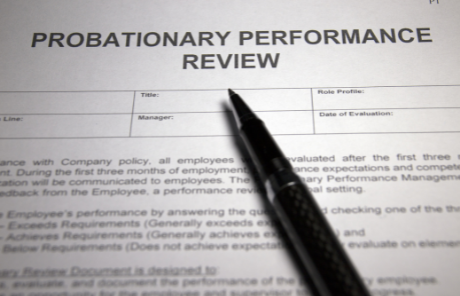
6 Tips to Prepare Effectively for Your Probation Review
- Posted by Joel Okoye
- March 13, 2023
Probationary periods are a common feature of many workplaces, designed to give employers an opportunity to evaluate new hires before making a permanent commitment. This period can last anywhere from a few weeks to several months, and during this time, employees are expected to demonstrate their skills and abilities, adapt to the workplace culture, and meet performance expectations. At the end of this period, employees usually undergo a probation review, where their performance is assessed and their employment status is determined. Whether your official probation period is 3 or 6 months (or longer) there are a number of things to be mindful of as you start out in a new role to ensure that your probation not only goes smoothly but also that at the end of it, you are able to confidently demonstrate your value to your employer through 3-6 months of hard work and achievements.
If you’re approaching the end of probation and your review is just around the corner, it’s quite common to feel like you’re still somewhat of a newbie that’s only a few weeks in, and this is part of what makes probation reviews so daunting to many. But it’s important to remember that they are not only there for your employer to evaluate your performance, but also an opportunity for you to review your time with them, assess whether it has met your expectations as well as whether you’re on the right track to completing your career goals. To help make your preparation as foolproof as possible we’ve given our top 6 tips on how best to prepare for a probation review:
1. Review the Objectives and Expectations
Before the end of the probation period, you should review the objectives and expectations that were set for you at the beginning of your employment. This includes your job description, performance metrics, and any other targets or goals that were set for you. Not only will it help you get a good sense of what is expected of you, but it will also give you a solid idea of how your performance will be evaluated.
Then, compare them to your performance in each area. How well are you stacking up to expectations? You should proactively identify any areas where you may be falling short, as this will allow you to possibly address these before the review and give yourself plenty to discuss with your manager. Furthermore, think about how the job description itself has met YOUR expectations and to what extent it was what you imagined. This way, you’ll be able to gauge how well yours line up with your manager’s and reveal any qualms or questions to be resolved or answered in the review.
2. Keep Track of Your Accomplishments and Review Your Work
Throughout your probation period, it’s important to keep track of your accomplishments and achievements. This includes any projects you have completed, goals you have reached, or improvements you have made in your work. Keeping a record of these accomplishments will make it easier to demonstrate your value to the organisation during the review and help you identify areas where you have excelled, as well as any area where you may need to improve in.
3. Seek Feedback
It’s important to seek feedback throughout your probation period, not just at the end as relying only on your own perspective when assessing your performance can make you blind to any shortcomings that you might otherwise have noticed and addressed, such as how you come across and how well you work within the team. Getting feedback from your colleagues will give you a better understanding of how you are performing, and where you may need to improve. Speak to your manager, colleagues, and other stakeholders, be open to constructive criticism and most importantly, use it to your advantage. Criticism is never easy to take but will always be most useful when seen as an opportunity to improve instead of something to be taken personally. Asking for your colleagues’ opinions and addressing any areas of concern will show that you are committed to your job, and willing to learn and improve.
4. Address any Issues or Concerns
If you are aware of any issues or concerns that may affect your probation review, it’s important to address these before the review. This could include any performance issues, conflicts with colleagues or managers, or any other challenges you may be facing. By addressing these issues proactively, you can show that you are committed to resolving them, and that you are taking your probation period seriously. Employee check-ins are a great way to voice any concerns you might have about your work and should be fully utilised if your firm uses it or any similar tools to receive feedback from employees.
5. Prepare for Common Questions:
While a probation review can feel like a step into the unknown, there are undoubtedly aspects of it that you can be very well-prepared for, such as common questions that are usually asked by managers to get your thoughts on certain areas of your work like the following:
- What parts of the job have you enjoyed
- What parts have you not enjoyed or are struggling with?
- Is the role what you had in mind when you started?
- What have you learned?
When discussing which aspects of the job you have or have not enjoyed, try to maintain a respectful and upbeat tone, as this might also include parts of the job you really struggled with, giving you the opportunity to voice any concerns. Professionalism is key here, as you don’t want to let this dominate the discussion and give your manager the impression that you’re trying to deflect criticism but rather, you should keep it clear and honest but concise and constructive, raising any suggestions on training or support that might be beneficial.
When asked about whether your expectations are being met, be honest about it and let them know if there’s anything you expected more or less of. Discuss whether it has brought you closer to achieving your career goals and what skills you expected to pick up during your probation. This is also a good opportunity to bring up what you’ve learned (if you’ve not been asked already) what training you’ve benefitted from and what tools you might’ve utilised that have helped improve your productivity, as it will show your manager how your value as an employee is increasing and give them an insight into how you work, learn and pick up new skills.
6. Stay Positive and Professional
Before we go on to discuss the possible results you can expect from your interview, it’s important to mention here that regardless of the outcome though, maintaining a positive and professional attitude will make for a better experience overall both during and after the review.
If you have performed well, this is an opportunity to demonstrate your value to the organisation and secure a permanent position. If you have not performed as well as you would have liked, then look at this as an opportunity to learn from your mistakes and improve your performance going forward. If the outcome is not what you had hoped for, don’t let it dampen or kill your confidence but rather see it as just a bump in the road of your career journey and something you can bounce back from with enough commitment to learning and improving.
What to Expect at The End of the Review:
There are three possible outcomes you can expect after your review, and whatever yours may be, it’s important to have the following points in mind so that you take a proactive approach to building on what you’ve learnt about your performance.
If you have passed – congratulations! Your hard work has paid off and you’re now a fully-fledged member of the team. Use this opportunity to think about what parts of your success you can build on and how you want to develop professionally going forward (our free guide on how to design your legal career can help with this). And remember, the tips in this guide can help with any formal reviews you might have in the future, so be sure to revisit it when necessary. It’s also worth checking in from time to time over the course of your employment to see if your career is on the right track and whether you’re any closer to achieving your career goals, and to help make this process clearer and easier, we have put together a career checklist you can use, which you can access here.
If your employer has come to the decision that your probation period will be extended, then it is likely because they do not feel that the requirements set out are being met and more time is needed to assess your performance. In this instance, it is important that you take any feedback and criticism to heart and take this opportunity to self-reflect and proactively apply what you’ve learned, so that you can go into your next review confident of how you’ve demonstrated your value to the company.
If you haven’t passed, either through your own choice, your employer’s or a mutual decision, then it’s a good time to start thinking about where to go from here. Consider the areas you have struggled/haven’t met expectations in and whether you might need further training to build your skillset. Use this as a springboard to get yourself closer to where you want to be, professionally.
At this point, it can be somewhat daunting not knowing how best to proceed and this is where speaking/re-engaging with a legal recruitment agency can be incredibly beneficial. Not only can their team of consultants aid you in putting together an improvement plan to boost your employability but they can make the job searching process far less stressful and time-consuming than it needs to be, and get you a role that best suits your skillset. The expert advice and support that they provide at this stage to help you move forward in your legal career can be invaluable. Our team at Clayton Legal are experienced in helping candidates navigate the job market and helping them every step of the way to get the most out of their job-searching efforts. If you find yourself unsure of which direction to take your legal career in, we’re here to give you all the support you need. Contact us here and let us help your career back on track.
End-of-probation reviews don’t have to be the necessary evil they are generally viewed as by candidates, as stated by Performance management software company, Lattice, in their article on Probation reviews, but done correctly, can be a constructive and positive experience for both parties especially if approached with openness and honesty, helping to set a realistic foundation for what happens next in your legal career. Your probation review can only be as helpful as you make it, and the right mindset and approach to it will be the key to how well you progress afterwards.
About Clayton Legal
Clayton Legal has been partnering with law firms across the country since 1999 and during that time has built up an enviable reputation for trust and reliability. We have made over 5,000 placements from partners to legal executives, solicitors to paralegals and legal IT personnel to practice managers.
If you are building your legal team or looking for your next career move, we can help. Call us on 01772 259 121 or email us here.











